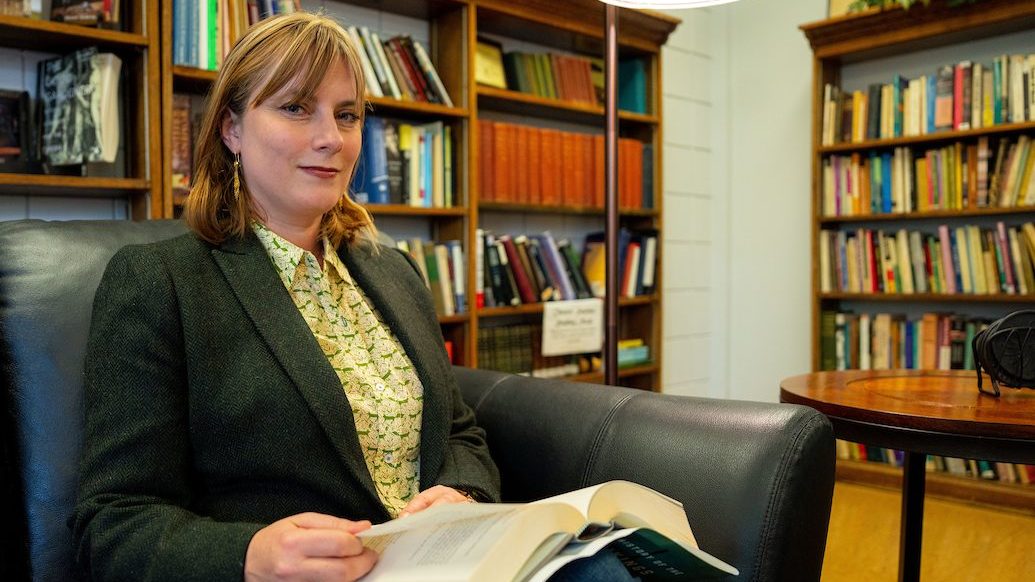
Harlan-Haughey shines new light on Chaucer’s lesser-known poem
Many English students read Geoffrey Chaucer’s “Canterbury Tales” at some point in their education, but few have the opportunity to explore the lesser-known works of the medieval poet. Sarah Harlan-Haughey, associate professor and interim chair of the Department of English at the University of Maine, is not only shining new light on one of Chaucer’s lesser-known, controversial works — she is bringing that keen insight to the UMaine classroom.
Harlan-Haughey says that Chaucer is an interesting poet to study even in modern times because his work is “super complex,” weaving in contextual references to other works as far back as ancient Greece, but funny and ironic enough to resonate with modern readers.
“The Legend of Good Women” is Chaucer’s third longest work. The poem retells classic tales of women betrayed by men — from Dido and Aeneas to Cleopatra and Mark Antony — in Chaucer’s tongue-in-cheek voice. The poem has often been written off in the academic world as a derisive and misogynistic satire, poking fun at the women in the stories.
“A lot of the scholarship up to this point is looking at Chaucer’s sources, seeing where Chaucer’s version changes the story or diverges from those received versions,” Harlan-Haughey says. “Source scholarship can be a big part of a medievalist’s job.”
Harlan-Haughey, however, has found that there is more nuance to the work than a purely misogynistic tale. She has begun to unravel some of the serious critiques that Chaucer makes of the men in these tales, showing that a poem that once might have been considered by scholars as “straight parody” is a more complex exploration of contemporary attitudes about sex and gender.
Harlan-Haughey so far has published two peer-reviewed articles on the “Legend of Good Women” in one of the field’s leading journals, the Chaucer Review. The first paper, published in 2017, looks at Chaucer’s retelling of the legend of Ariadne, who was abandoned by Theseus after helping him escape the minotaur in the labyrinth. The most recent study, released this year, explores Chaucer’s retelling of the story of Jason and Medea, another Greek tale where the magical Medea is abandoned by Jason.
“In the two articles I have published so far, I take a hard look at the heroes and the way that Chaucer portrays them as predatory figures who ruin the lives of women around them. For Chaucer, legendary characters like Jason and Theseus are figures of waste and destruction, which is an against-the-grain reading of these classical heroes,” Harlan-Haughey says.
Harlan-Haughey also explores the way that the social performance of these poems, which would have been common in Chaucer’s time, might have been important to understanding their import and significance.
“We can’t know what a medieval audience member would make of these poems, but we can make some guesses based on the kinds of things that they like to consume and think about,” Harlan-Haughey says. “Chaucer’s critiquing Jason in a subtle way that makes the audience identify with Jason and then realize his behavior is problematic. As a result, they might have to do some self reflection–if Jason’s behavior towards women is monstrous, what does that mean for the audience? It might be a way to start a conversation about what we might call toxic masculinity now. And conversation generation was one of the main goals of much medieval poetry–the stories are provocative attempts to get a broader discussion going”
Harlan-Haughey teaches courses on Chaucer at the University of Maine and said she often finds inspiration in class, workshopping new ideas with her students. She continues to work on her “Legend of Good Women” research year after year in between other larger research projects. Harlan-Haughey hopes before she retires, she will have published an article about each of the 10 legends in this Chaucerian anthology and changed the conversation about these poems in a meaningful way.
Meanwhile, Harlan-Haughey’s larger focus as UMaine’s medievalist in the Department of English focuses on “outlaws, landscapes and memory”, and she is currently working on a book about the way that natural disasters are depicted in medieval literature. She sees her work — as both an academic and teacher — as an important way to “honor the human experience.”
“In the humanities, we’re trying to connect on a really intense level with somebody from a different time or place which is always important work,” Harlan-Haughey says. “We are asking our students and readers to engage in a radical act of empathy and critical thinking. This kind of work stretches our own minds and horizons.”
Contact: Sam Schipani, samantha.schipani@maine.edu
